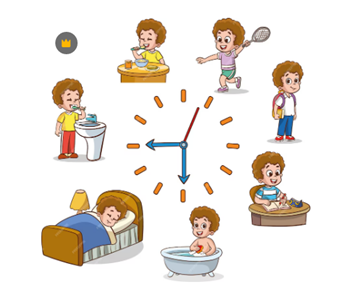Building Strong Routines: Why Structure Helps Kids Feel Secure
- Bukit Sunrise School
- Jul 24, 2025
- 4 min read

Introduction
In this article, we will explore the psychological and developmental importance of structure in a child's life and discuss ways to create a daily routine that works.
Children thrive on routine and structure. A predictable daily schedule can offer them a sense of security and stability, reducing anxiety and fostering healthy emotional and cognitive development. For parents and caregivers, establishing a strong routine might seem like a challenge, but the benefits are immeasurable.
In this article, we will explore the psychological and developmental importance of structure in a child's life and discuss ways to create a daily routine that works.

The Psychological Importance of Routine
A routine is a sequence of actions regularly followed, and for children, it often involves consistent activities throughout the day, such as: wake-up times, meals, playtime, and bedtime. Studies show that structured environments can significantly reduce stress in children, particularly for those who experience high levels of anxiety or who are navigating transitions like school changes or moving to a new home.
Security and Predictability
The key reason routines are so effective is that they foster predictability. When a child knows what to expect next, they can relax and engage more fully in each activity. This sense of control over their environment helps reduce anxiety, especially in younger children who may not yet have the coping mechanisms for handling unpredictability.
As developmental psychologist, Jean Piaget, noted, children need to feel a sense of order to effectively understand the world around them. Routine helps them to feel that their world is safe and manageable.
Attachment and Emotional Regulation
Children rely heavily on caregivers for emotional support and validation. Consistent routines help children form secure attachments, which are essential for emotional regulation. A structured day provides children with comfort, as they can anticipate when they will receive nurturing attention, when they will be expected to engage in independent activities, and when they will be allowed to rest.
Benefits of Routines for Kids

Promotes Emotional Well-being
A structured environment helps children navigate their emotions more effectively. When they know what comes next, children feel less anxious and better able to focus on the task at hand. This emotional safety leads to better outcomes in behavior and mood regulation.
Encourages Independence
When routines are well-established, children know exactly what’s expected of them. This fosters independence as they learn to complete tasks on their own, such as getting dressed, brushing teeth, and completing homework. Over time, this builds confidence and autonomy, as children realize they can handle the responsibilities set before them.
Improves Academic Performance
Routine is especially critical during school years. A consistent after-school routine that includes time for homework, breaks, and rest can help children perform better academically. Establishing a set time for studying allows kids to approach learning with a focused mindset, reducing distractions and creating a rhythm that enhances productivity.
Boosts Mental Health
A stable routine helps children feel in control of their day, which has significant mental health benefits. It reduces uncertainty and provides a sense of accomplishment as children complete regular tasks. This sense of competence can help boost self-esteem and reduce the likelihood of developing mental health issues, such as anxiety or depression.
How to Create a Routine That Works
Creating a routine that suits the unique needs of your child requires balance and flexibility. While consistency is important, it is also crucial to allow room for spontaneity and individual preferences.
Involve Your Child in the Process
You don’t need to dictate every part of the day. Instead, engage your child in creating their own schedule. For example, they can help choose their favorite activities or select the order of events. This approach not only empowers them but also makes them more likely to follow through with the routine.
Set Consistent Wake-up and Bedtime Times
Children benefit from a consistent sleep schedule. Going to bed and waking up at the same time every day regulates their internal body clock, leading to better sleep quality. When children are well-rested, they are more emotionally resilient and better equipped to manage daily challenges.
Provide Time for Play and Relaxation
While routines need to be structured, they should also incorporate breaks. Downtime is crucial for children’s mental and emotional health. This gives them a chance to engage in creative play, unwind and recharge, making them more receptive to the next activity in the schedule.
Be Flexible When Needed
Life happens. There will be days when the routine gets disrupted—whether due to illness, a family emergency or a special event. It's important to acknowledge these disruptions while gently returning to the routine as soon as possible. Teach your child that flexibility is an important skill, too, but the overall structure remains a helpful guide.
Overcoming Challenges in Routine Building
Building a strong routine can face resistance from both children and parents. Children may protest at first, particularly if they are used to more freedom. However, by being consistent, calm and patient, children gradually learn to appreciate the stability that routines offer.
Parents might also struggle to maintain consistency, particularly with busy schedules and varying demands. It can be helpful to start small, focusing on one or two areas of the routine at a time and gradually build from there.
References:
Piaget, J. (1952). The Origins of Intelligence in Children. International Universities Press.
Ginsburg, K. R. (2007). "The Importance of Play in Promoting Healthy Child Development and Maintaining Strong Parent-Child Bonds." Pediatrics, 119(1), 182-191. https://doi.org/10.1542/peds.2006-2697
Vostanis, P. (2006). "Children and Trauma: A Guide for Parents and Teachers." Psychiatric Times. https://www.psychiatrictimes.com/view/children-and-trauma-guide-parents-and-teachers
Miller, E. A., & Davis, B. L. (2005). "Parenting and the Development of Emotional Regulation in Children." Developmental Review, 25(4), 575-591. https://doi.org/10.1016/j.dr.2005.09.003
National Association for the Education of Young Children (NAEYC). (2020). "Building Positive Relationships with Children." NAEYC.org. https://www.naeyc.org/our-work/families/positive-relationships
























Comments